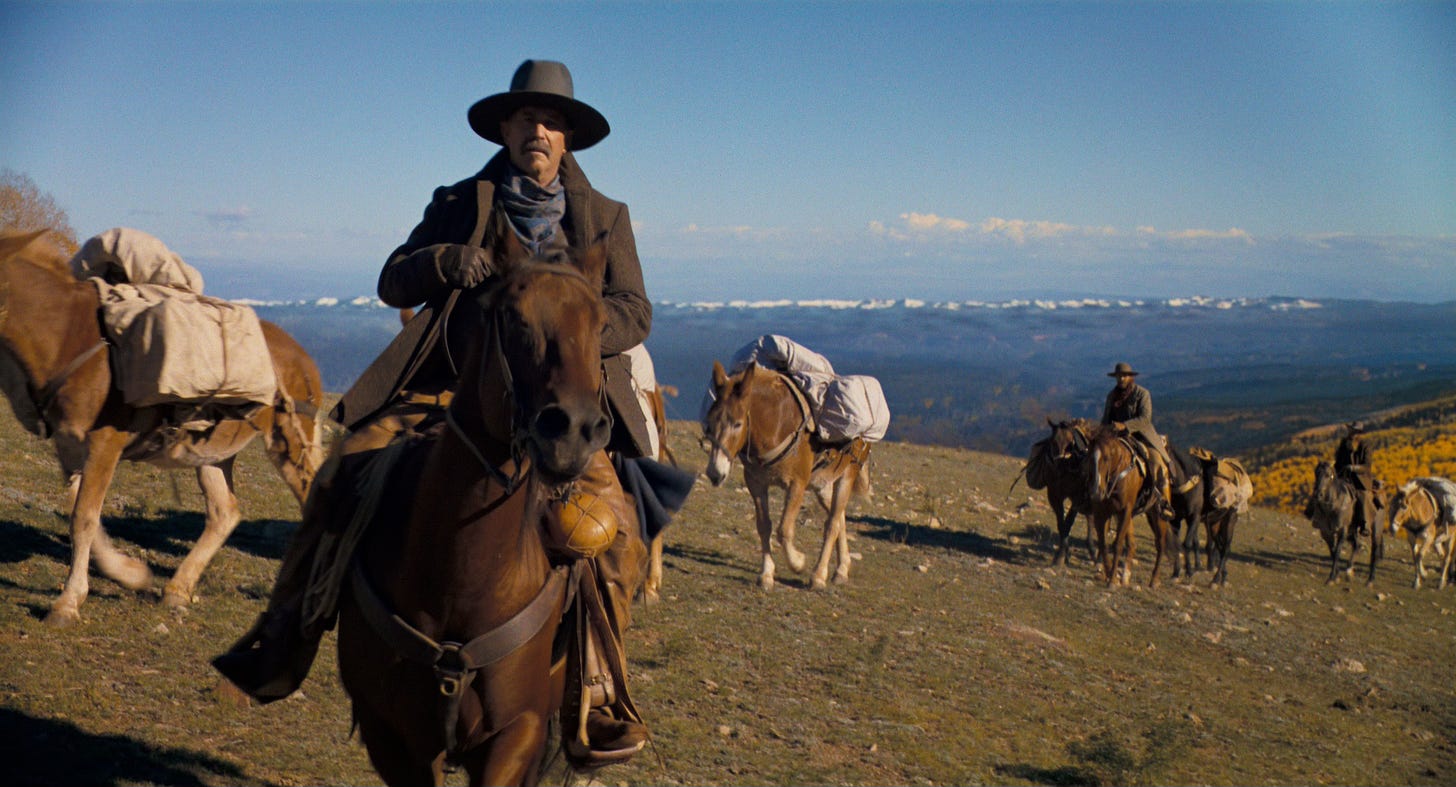
Discover more from Commentary Track
'Megalopolis' and 'Horizon' Can't Flop
Box office returns won't recognize the value of directors achieving their vision.
Francis Ford Coppola’s Megalopolis debuted at Cannes last week, and Kevin Costner’s Horizon: An American Saga will premiere at the festival today. Both films are passion projects for their directors, and they’ve had to use their own money rather than get a major studio to foot the bill. Coppola started active development on Megalopolis back in 1983, and he put $120 million into the production. Costner has wanted to make Horizon since 1988, and to fully fund the project (which he envisions as a four-film series), he had to take a mortgage on 10 acres of land in coastal Los Angeles.
There is a high likelihood that both films will struggle at the box office. Megalopolis still doesn’t have a U.S. distributor, and the movie received mixed reactions out of Cannes. In the case of Horizon, westerns are far from a sure bet with U.S. audiences—and while Costner had a hit show with Yellowstone, he’s no longer the A-list draw of the 80s and 90s.
But even if both of these films flounder at the box office, that doesn’t make them failures. At this point, I’d argue that Coppola and Costner have already succeeded.
Art is a risk. Studio executives prefer to look at movies as “product,” and that’s not an unreasonable viewpoint for an industry town. These are and have always been businesses, and the tricky part has been to find a way to balance the artistic goals of the filmmakers with the business practicalities of getting a return on an investment. Studios seek to mitigate risk as much as possible to maximize their returns, and whether that’s been through the studio system of the 1920s-1950s, the greater reliance on independent stars from the 1960s-2000s, to the all-in embrace of intellectual property from the 2000s forward, studios may claim to celebrate the artist and storytelling, but they’re always looking at the bottom line.
Looking at Megalopolis and Horizon on paper, I can see why studios would be reluctant to back such projects. Neither is an adaptation with a built-in audience. While both Coppola and Costner are Oscar-winning directors, we’re long past the days when putting their names on something would mean a hit opening weekend.
Coppola and Costner could have said, “Well, the studios know best, and if there’s no market for our movies, then we should pack it in.” Coppola could keep making wine, and Costner could keep doing seasons of Yellowstone. These are safe, reasonable options for two guys with secure legacies. But the thing about art is that it’s an itch. True storytellers don’t tell stories because of market conditions; they tell stories because they have to. Imagine having a story that you feel like only you can tell, and it’s been nagging at you for over thirty years. You have a choice: go to your deathbed knowing you could have risked some of your fortune to make it a reality, or take the risk knowing it probably won’t pay off in a business where you’ve spent decades making your career.
I don’t think Coppola and Costner are hopelessly naïve about their prospects. This isn’t their first rodeo, and they know what flops look like. But they also know that their time on this Earth is finite. Coppola is 85, and Costner is 69. How many movies do they have left? Should their highest goal in life be to adapt some IP so they can be #1 at the box office again? Or is it better to say, “I’m going to invest in a story I have to tell, regardless of how many people see it”?
I’m not saying that Megalopolis or Horizon are good movies (I haven’t seen either). I’m not even saying that you need to be a fan of Coppola and Costner. I’m saying that we should celebrate artists who take personal risks, especially when those risks involve their own money. What we shouldn’t do is assume that playing armchair box office analyst is the highest goal we can aspire to as viewers.
As is often the case, the box office returns for a film is the least interesting thing about it. That’s not to say that the box office is inconsequential—but in the case of these two films and these two filmmakers, it kind of is. Let’s assume Megalopolis gets U.S. distribution and only makes $1 million in its entire domestic run. Do you think that the first line of Coppola’s obituary will read, “Francis Ford Coppola, who lost $119 million making Megalopolis, died yesterday…” or will it read, “Francis Ford Coppola, Oscar-winning director of The Godfather Trilogy and Apocalypse Now…”?Win or lose, do you think Horizon will top-line Costner’s filmography, or is it going to be about Bull Durham, Dances with Wolves, Field of Dreams, The Untouchables, and his other hits?
If these movies flop, it will hurt the personal fortunes of these men, but they’re Hollywood veterans, and you can’t say they were blithely walking into this situation. But more importantly, we are not their accountants. We are not their agents. We are not their business managers. We are not their heirs. We are their audience, and the best thing we can do is not play bean counter, but engage with the art. If we hate it, so be it! If we’re bored, that is also a valid reaction! But we shouldn’t cosplay as studio executives and tut-tut that we don’t see a lot of money here.
There will be those who will rush to dismiss Megalopolis and Horizon as vanity projects, to which I can only reply, “Vanity?! In Hollywood?! How did such a trait ever come to humble old Tinseltown?” There will be those who say that Coppola and Costner should have spent their money differently or made different movies or any other nonsense from people who have no idea how to make a hit movie. And there will be others who simply ask, “Why did you spend so much of your money to make…this?”
I ask that as viewers, we try to be better than that. It’s one thing to critique studio spending. They pride themselves on being businesses, and maybe blowing $400 million for the rights to The Exorcist is worthy of interrogation. But if filmmakers who are nearing the end of their careers want to spend their own money to finally make their dream project a reality, then they should spend that money. Coppola and Costner know what’s worse than having a lousy opening weekend—never even getting to that weekend in the first place.
Subscribe to Commentary Track
A pretty good newsletter about movies, TV, and media.













Great piece. In keeping with your point, I look at films like "Megalopolis" and "Horizon" and think: "How did I get so lucky to experience two big audacious films that are unlikely to make their budgets back?" Put them both in my eyeballs now!
Just terrific! I don’t know how you do it!